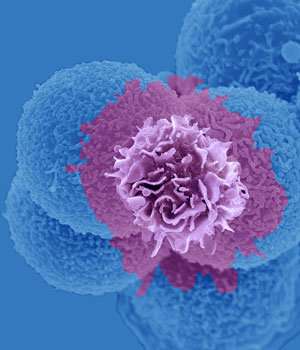Mysteries of the developing immune system have been revealed in a study of fetal dendritic cells

The fetal immune system is fully developed and functional from as early as 16 weeks gestation, but has a mechanism to keep it suppressed until after birth, according to an A*STAR-led study. Their findings could shed light on the immunological mechanisms underlying fetal-maternal health problems such as pre-eclampsia.
"People thought that the fetal immune system was defective because it was not mature, but we've discovered that it's highly dynamic, highly functional, and in fact represents another specialization," says Florent Ginhoux, from the Singapore Immunology Network at A*STAR, who co-led the study with Jerry Kok Yen Chan from the KK Women's and Children's Hospital, Singapore.
Ginhoux and co-authors analyzed fetal tissues—donated under strict ethical guidelines—for dendritic cells, which are immune cells that sample the environment for potential threats and pass that information to the T cells and B cells to ward off those threats.
The researchers discovered that not only do dendritic cells exist as early as 12 weeks gestation, but, when stimulated by molecules that interact with the toll-like receptors found on the surface of the cells, mimicking the interaction with a bacterial or viral attack, they behave almost exactly the same as adult cells.
"We found that the cells in the tissue were able to migrate to the lymph nodes very early, which means they were able to talk to T cells, so everything looks similar to what we find in adults," Ginhoux says.
But this posed further questions: if a fetal immune system responded to threats in exactly the same way as an adult immune system, the resulting inflammation could theoretically cause harm to the developing fetus.
The research team compared genes from fetal and adult dendritic cells, and found one very significant difference; fetal dendritic cells over-express an enzyme called arginase-2, which is known to block the T cell secretion of a key inflammatory signaling molecule called TNF-alpha during inflammation.
They tested this by co-culturing adult and fetal dendritic cells with T cells, and showed that only the adult dendritic cells triggered production of large amounts of TNF-alpha from the T cells, while fetal dendritic cells inhibited it through release of arginase-2.
The results could help our understanding of pregnancy conditions such as pre-eclampsia and gestational diabetes, which Ginhoux suggests could be the result of a disruption in this careful balance of immune activation and tolerance in the fetus.
More information: Naomi McGovern et al. Human fetal dendritic cells promote prenatal T-cell immune suppression through arginase-2, Nature (2017). DOI: 10.1038/nature22795


















